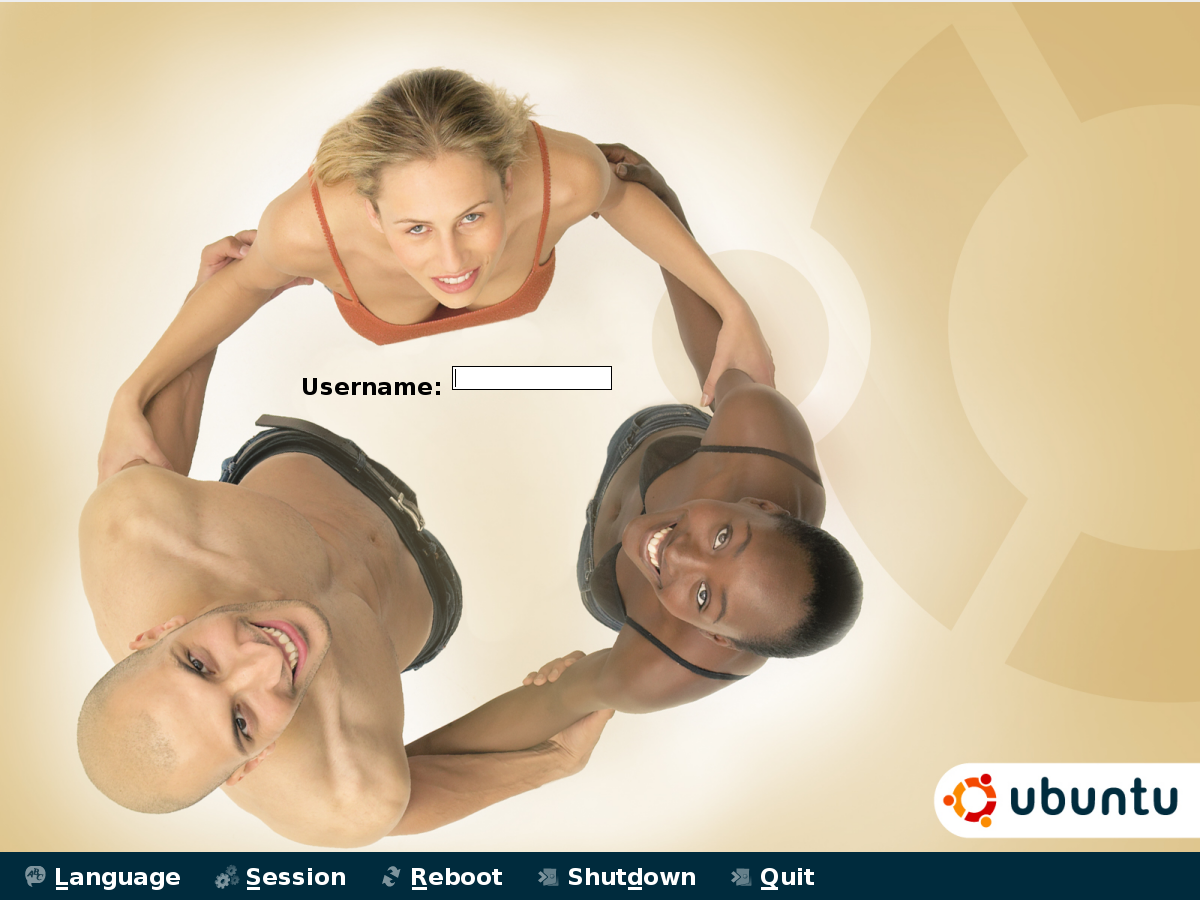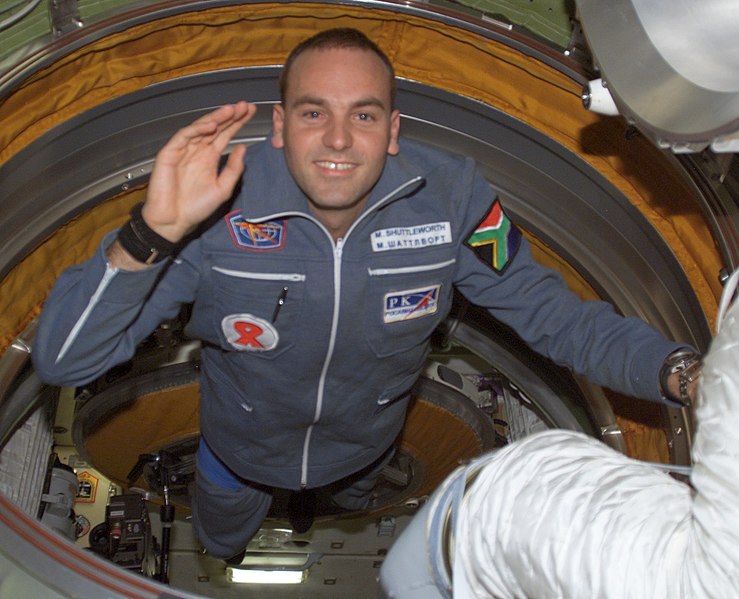Ubuntu[国际音标:国际音标:/uːˈbuːntuː/(英语)[3];[ùɓúntú](祖鲁语)]是一个以桌面应用为主的Linux操作系统,其名称来自非洲南部祖鲁语或豪萨语的“ubuntu”一词(译为吾帮托或乌班图),意思是“人性”、“我的存在是因为大家的存在”[4]。Ubuntu建基于Debian发行版和GNOME桌面环境,与Debian的不同在于它每6个月会发布一个新版本。
普通的桌面应用版可以获得18个月的支持,标为LTS的桌面应用版可以获得更长时间的支持。[5] [1]例如,Ubuntu 6.06 LTS,(代号Dapper Drake)的版本和Ubuntu8.04 LTS(代号Hardy Heron) ,其桌面应用系列可以获得为期三年的技术支持,服务器版可以获得为期五年的技术支持[6]。Ubuntu的目标在于为一般用户提供一个最新的,同时又相当稳定的主要由自由软件构建而成的操作系统。Ubuntu具有庞大的社群力量[7][8],用户可以方便地从社群获得帮助。
Kubuntu与Xubuntu是Ubuntu计划正式支援的衍生版本,分别将KDE与Xfce桌面环境带入Ubuntu,Edubuntu是一个针对学校教学环境而设计,试图让低龄儿童可以轻松学会使用的衍生版本。 [9]
Ubuntu及其衍生版本至今似乎没有正式的中文译名,至少从Ubuntu中文网[10]和Ubuntu正体中文网[11]的官方网站上来看是这样。班图(乌班图)曾经作为非官方的译名被一些中文用户使用,不过这一不完整的音译并未得到一致认可。
历史与发展过程
Ubuntu由马克·舍特尔沃斯(en:Mark Shuttleworth)创立,其首个版本于2004年10月20日发布,它以Debian为开发蓝本。[12]与Debian稳健的升级策略不同,Ubuntu每六个月便会发布一个新版,以便人们及时地获取和使用新软件。Ubuntu的开发目的是为了使个人电脑变得简单易用,同时也提供针对企业应用的伺服器版本。Ubuntu的每个新版本均会包含当时最新的GNOME桌面环境,通常在GNOME发布新版本后一个月内发行。与其他基于Debian的Linux发行版,如MEPIS、Xandros、Linspire、Progeny和Libranet等相比,Ubuntu更接近Debian的开发理念,它主要使用自由、开源的软件[13],而其他发行版往往会附带很多闭源的软件。
Ubuntu建基于Debian的不稳定分支:不论其软体格式(deb)还是软体管理与安装系统(Debian Apt/Synaptic)。Ubuntu的开发者会把对软体的修改及时反馈给Debian社群,而不是在发布新版时才宣布这些修改[12]。事实上,很多Ubuntu的开发者同时也是Debian主要软体的维护者。不过,Debian与Ubuntu的软体并不一定完全兼容,也就是说,将Debian的软体包安装在Ubuntu上可能会出现兼容性问题,反之亦然。[14]
Ubuntu的运作主要依靠Canonical有限公司的支持,同时亦有来自Linux社区的热心人士提供协助。Ubuntu的开发人员多称马克·舍特尔沃斯为SABDFL(是self-appointed benevolent dictator for life 的缩写,即自封的项目决策者)[15]。在2005年7月8日,马克·舍特尔沃斯与Canonical有限公司宣布成立Ubuntu基金会,并提供1千万美元作为启始营运资金。成立基金会的目的是为了确保将来Ubuntu得以持续开发与获得支持,但直至2006年,此基金会仍未投入运作。马克·舍特尔沃斯形容此基金会是在Canonical有限公司出现财务危机时的紧急营运资金。
目前,Ubuntu的最新长期支持版本为‘Hardy Heron’,即在2008年4月24日所推出Ubuntu 8.04 LTS(长期支持版),使用者可以透过船运服务(shipit)[16]来获得免费的安装光碟。前一个LTS版本(Ubuntu 6.06)也有提供免费船运服务,然而其后的Ubuntu 6.10版却没有提供免费的船运邮寄光碟服务,使用者只可由网站上下载光碟映像档烧录并安装。[17]。Ubuntu 6.06释出当时曾有消息指出往后不会再对非长期支持版提供船运服务,但在Ubuntu7.04版推出时,船运服务再度启动,而此版并非长期支持版。
已于2008年4月发布的 Ubuntu 8.04 和6.06一样,都有着 Long Term Support (LTS) 的标签,代表着这个版本也将获得更长时间的技术支援(Desktop版3年,Server版5年)。
[编辑] 特色
[编辑] 系统管理
Ubuntu十分重视系统安全,所有系统相关的任务均需使用Sudo指令是它的一大特色,这种方式比传统的以系统管理员帐号进行管理工作的方式更为安全;[2]Ubuntu十分注重系统的易用性,标准安装完成后,一般就可以投入使用,简单地说,就是安装完成以后,使用者无需再费神安装浏览器、办公软件、多媒体软件等常用软件,一般也无需下载安装网卡、声卡等硬件设备的驱动;Ubuntu的开发者与Debian和GNOME开源社区合作密切,其各个正式版本的桌面环境均采用GNOME的最新版本,通常会紧随GNOME项目的进展而及时更新(同时,也提供基于KDE、XFCE等桌面环境的衍生版本);Ubuntu与Debian使用相同的deb 软件包格式,可以安装绝大多数为Debian编译的软件包,但并不能保证完全兼容。
[编辑] 开发意念
Ubuntu计划强调易用性和国际化,以便能为尽可能多的人所用。在发布5.04版时,Ubuntu就已经把万国码(UTF-8 Unicode)作为系统预设编码,用以应对各国各地区不同的语言文字,试图给使用者提供一个无乱码的交流平台。
Ubuntu的所有发行版本都可以免费获取。除了可下载光碟映像档(CD Image)外,使用者也可通过邮寄服务[16]免费获取安装光碟。与其他大型Linux厂商不同,Ubuntu不对所谓“企业版”收取升级订购费(意即没有所谓的企业版本,人人所使用的版本皆一样,使用者只有在购买官方技术支援服务[18]时才要付钱)。
此外,Ubuntu计划强调要尽量使用自由软件,要为各个版本的用户提供便捷的升级途径。
[编辑] 安装设定
一直以来,Ubuntu均支持主流的i386、AMD64与PowerPC平台,自2006年6月,Ubuntu新增了对升阳电脑的UltraSPARC与UltraSPARC T1平台的支持。
在发行初期,Ubuntu会提供一张安装光盘与一张用来预览的Live CD。待Ubuntu 6.06 LTS发布时,原来的Live CD除预览外,还可以用来安装系统,即变更为Desktop CD;而原有的安装光盘继续使用文字安装界面,并改名为Alternate install CD。Ubuntu的后续版本均沿袭了这一变动。
安装Ubuntu至少需要256MB记忆体,3GB硬碟空间,[19]它默认采用ext3文件系统格式(也可自选其他文件系统格式。Ubuntu可以自由读写FAT32和NTFS分区[20])。通过Samba软件,Ubuntu可以方便地与Windows等操作系统互传文件。
[编辑] 其他特色
Ubuntu有一个叫ubuntu-calendar 的软件包,安装后,它会随系统升级自动下载桌面壁纸图像。由于其中部分壁纸为女性裸体照片,以致Ubuntu被幽默地称为“色情发行版”[21]、“Linuxxx”[22]与其他类似名称。2005年5月,颇具有争议的Ubuntu-calendar未经公告就暂停发行了。现在,2004年10月到2005年4月的月历壁纸仍可以在Ubuntu储存库中找到。
[编辑] 软件管理
 主条目:Debian Apt
主条目:Debian Apt
Ubuntu的软件管理系统与Debian的类似,所有软件分为main、restricted、universe 和 multiverse 等4类,每一类为一个“组件(component)”,代表着不同的使用许可和可用的支持级别。一般来说,官方支持的main 组件主要用来满足大多数计算机用户的基本要求,restricted(“版权限制”)组件主要用来提高系统的可用性,因此通常需要安装这两类组件中的软件。
[编辑] 组件介绍
main 即“基本”组件,其中只包含符合Ubuntu的许可证要求并可以从Ubuntu团队中获得支持的软件,致力于满足日常使用,位于这个组件中的软件可以确保得到技术支持和及时的安全升级。此组件内的软体是必须符合Ubuntu版权要求(Ubuntu license requirements)[23]的自由软体,而Ubuntu版权要求大致上与Debian自由软体指导纲要(Debian Free Software Guidelines)相同。
restricted 即“受限”组件,其中包含了非常重要的,但并不具有合适的自由许可证的软件,例如只能以二进制形式获得的显卡驱动程序。由于Ubuntu开发者无法获得相应的源代码,restricted组件能够获得的支持与main组件相比是非常有限的。
universe 即“社区维护”组件,其中包含的软件种类繁多,它们或许采用受限于许可证,或许不是,但都不为Ubuntu团队所支持。
multiverse 即“非自由”组件,其中包括了不符合自由软件要求而且不被Ubuntu团队支持的软件包,通常为商业公司编写的软件。
各类组件说明可见下表
| 自由软体 | 非自由软体 | |
| 官方支持 | Main | Restricted |
| 不被官方支持 | Universe | Multiverse |
[编辑] 软件维护
Ubuntu的新版一旦发行,该版本的软件库就会被冻结,此后只对库提供安全性更新。为此,官方推出了一个名为Ubuntu Backports[24]的后续支援计划,让使用者可以在不更新软件库的情况下,获得和使用各类新版的应用软件。
由于Linux系统受病毒的威胁不大[25],因此Ubuntu系统一般无需安装防毒软件。管理员们如有需要,可自行安装ClamAV,以便扫描和清除服务器中的Windows病毒。Ubuntu系统中默认带有iptables防火墙软体,但不提供相应的图形设置界面,使用者可自行安装firestarter,以便通过图形界面设置防火墙。
安装软件时可以通过执行apt-get命令,或使用Synaptic工具来完成。与Windows不同,Ubuntu的使用者一般无需四处搜索,逐一下载或购买相应的安装程序。Ubuntu能够使用的软件大多存放在被称为“源”的服务器中,使用者只要执行相应的apt-get命令(或使用Synaptic工具进行相关操作),系统就会自动寻找、下载和安装软件了。
[编辑] 私有版权软体的采用
虽然Ubuntu主要采用自由软体,但也接纳部分可以自由散发的私有软件,并将它们放在 multiverse 组件中。Ubuntu 还为第三方软件设立了认证程序[26]。
Ubuntu发行版中不包含的部分常用软件:
- 破解DVD加密的解密软体DeCSS。
- 多媒体编码与解码程序库,如Windows Media。
- 部份广受欢迎的以私有版权形式发布的浏览器插件,如Adobe(合并前为Macromedia)出品的Shockwave(无Linux版本)和Flash——其授权(EULA)禁止Linux发行版将其收录在光盘或映像文件中。Ubuntu 把这个插件指定为 multiverse 中的一个软件包(flashplugin-nonfree),系统接到安装这个软件包的请求时,会自动从Adobe的网站下载Linux版Flash插件并安装。
[编辑] 发布周期
Ubuntu每6个月发布一个新版,每个版本都有代号和版本号。版本号源自发布日期,例如第一个版本,4.10,代表是在2004年10月发行的。[27]下表列出了以前和计划中的发布:
| 版本 | 发布日期 | 代号 | 临近的主要更新 |
|---|---|---|---|
| 4.10 | 2004年10月20日 [28] | Warty Warthog | |
| 5.04 | 2005年4月8日 [29] | Hoary Hedgehog | |
| 5.10 | 2005年10月13日 [30] | Breezy Badger | |
| 6.06 LTS | 2006年6月1日 [31] | Dapper Drake | 6.06.1 发布于 2006年8月10日 |
| 6.10 | 2006年10月26日[32] | Edgy Eft | |
| 7.04 | 2007年4月19日[33] | Feisty Fawn | |
| 7.10 | 2007年10月18日 [34][35] | Gutsy Gibbon | |
| 8.04 LTS | 2008年4月24日 [36][37] | Hardy Heron | 8.04.1 发布于 2008年7月4日 |
| 8.10 | 2008年10月31日 [38] | Intrepid Ibex |
[编辑] 长期支持版本
代号“Dapper Drake”的Ubuntu 6.06 LTS是第一个获得长期支持的版本,Canonical公司计划对6.06的桌面系列版本提供三年的更新及付费技术支持服务,对服务器版则提供五年的支持。Ubuntu 6.06 LTS包括GNOME 2.14、Mozilla Firefox 1.5.0.3、OpenOffice.org 2.0.2、Xorg7.0、GCC 4.0.3以及2.6.15版的Linux内核,2006年8月10日发布的首个维护更新版本6.06.1。[39]因为其较长的支持周期,Canonical宣布将继续为Dapper Drake提供船运服务,但不支持随后发布的 Edgy Eft 。不过,随着 Feisty Fawn 版的发布,船运服务再次启动,用户们又可以免费获取安装光盘了。[40]
[编辑] 最新版本
现在,Ubuntu的最新版是代号为“Hardy Heron”的8.04版。
[编辑] 其他分支
Ubuntu还有一个代号为Grumpy Groundhog的分支,[41],这个分支直接从Ubuntu的软件版本控制系统里获取软体的源代码,主要用于测试和开发。由于这个分支不稳定,因此不对公众开放。
[编辑] 各界评价
[编辑] 反响
一年多以来,Distrowatch.com上的Ubuntu介绍页是访问率最高的页面,[42]2005年于伦敦举行的Linux世界论坛及会议(LinuxWorld Conference and Expo)上,Ubuntu被评为读者所选的最佳Linux发行版。[43] Ubuntu也经常被网络和纸质出版媒体评审,[44][45]很多评审者认为Ubuntu的成功主要原因在于其拥有一个庞大的社群,使用者可以便捷地从中获得帮助和支持。[7][8] informationweek网站于2008年5月对7款主流的Linux发行版系统进行了评测,包括openSUSE,Ubuntu 8.04,PCLinuxOS,Mandriva Linux One,Fedora,SimplyMEPIS和CentOS 5.1,结果是Ubuntu获胜。
[编辑] 批评
Ubuntu源自Debian,但Debian的创始人Ian Murdock却不满意Ubuntu。他认为,虽然Ubuntu是优秀的Linux发行版,也促进了Debian的全球化,但Ubuntu另建软件库,而不是直接改进Debian已有的软件库,因此出现了与Debian不兼容的问题。他希望 Ubuntu 能与 Debian 进行更为紧密的合作,使其改进也可以被Debian所采用[46]。
[编辑] 相关计划
[编辑] 正式衍生版本
目前Ubuntu正式支援的衍生版本包括:
- Kubuntu:使用和Ubuntu一样的软体库,但不采用GNOME,而是采用KDE作为预设的桌面环境,以满足偏爱KDE的Ubuntu用户。
- Edubuntu:是为教育量身定做的发行版,包含很多教育软件,可以帮助教师方便地搭建网络学习环境,管理电子教室。
- Xubuntu:属于轻量级的发行版,使用Xfce4作为默认桌面环境,与Ubuntu采用一样的软体库。
- Ubuntu Server Edition:自Ubuntu 5.10版(Breezy Badger)起与桌面版同步发行,[47] 可用作多种服务器,如电邮服务器、基于LAMP的网站服务器、DNS服务器、文件服务器与资料库服务器等。[47]与桌面版本相比,服务器版的光碟映像较小,运行时对硬体要求较低,最少只需要有500MB硬碟空间和64MB记忆体。[19]服务器版通常不提供任何桌面环境。
- Ubuntu Studio:适合于音频,视频和图像设计的版本。
- Ubuntu JeOS:一个高度精简的、专门面向虚拟化应用的版本。
这些衍生计划与Ubuntu紧密相关,从2006年起,它们与Ubuntu同步发行。
另外,马克·舍特尔沃斯承诺将制作Ubuntu-libre发行版,只使用自由软体基金会认证过的自由软体。 [48][49]然而自由软体基金会官方已于2006年11月2日推出gNewSense作为只使用自由软体的Linux发行版,这个发行版虽然基于Ubuntu,但并非Ubuntu的官方分支。
[编辑] 非正式衍生版本
- nUbuntu:专注于安全工具的版本。
- Ubuntu Lite:为旧电脑而设的版本。
- zUbuntu:为IBM zSeries 主机移植的版本。
- Ebuntu:基于Enlightenment 0.17桌面环境并附有视窗管理员的Ubuntu修改版。
- Fluxbuntu:基于 Fluxbox桌面环境的修改版。
- Gnoppix:基于Ubuntu Live CD而研制的以GNOME为预设桌面环境的Live CD。
- Dubuntu:由中国大陆爱好者制作的Ubuntu改进版,能够更好地支持中文,并且添加了很多软件的Live CD。
- hiweed:由Xubuntu的LiveCD定制而来的版本,根据需要对软件包进行了适当地增删。
- gOS:基于Enlightenment桌面环境,整合Google多数的线上服务的版本。(并非由Google官方所开发)
- Linux Mint 5 Elyssa: 基于Ubuntu 8.04的Linux发行版, 目标是提供一种更完整的即刻可用体验[50]。
- Ubuntu Eee(eeeXubuntu): 专为华硕的Eee PC定制。
[编辑] 参与中文翻译
由Ubuntu母公司Canonical有限公司所架设的Launchpad网站提供了在线翻译服务,任何人都可以通过这个网站协助翻译Ubuntu。
详细的翻译说明,请参见Launchpad条目。
[编辑] 回报相关错误及Bug
由Ubuntu母公司Canonical有限公司所架设的Launchpad网站提供了一套线上回报软体Bug的机制,任何人都可以把自己所发现的软件Bug、功能缺陷和安全漏洞通过这套机制回报给开发小组。
详细的回报说明,请参见Launchpad条目。
[编辑] 参见
[编辑] 注释
1. ^ 这是免费提供的支持,其包括了安全性更新、引数据损失的重要漏洞修补与额外的翻译。若要其他的技术支持,则需要购买其商业支持服务。值得注意的是LTS版(即长期支持版)所获的支援期更长,详情可参看内文。
2. ^ sudo为superuser do 的简写,即超级用户的工作,在Ubuntu的预设环境里,root(即管理员)帐号是停用的,所有与系统相关的工作指令均需在进行时于终端机介面输入sudo在指令前方,并输入密码确认,这样做是为了防止因一时失误对系统造成破坏。sudo工具的预设密码是当前帐户的密码。
[编辑] 参考资料
[编辑] 引用资料来源
- ^ The UltraSPARC and UltraSPARC T1 platforms are only supported by the Server Edition.
- ^ Edgy Eft (6.10) was the last version to officially support the PowerPC architecture; the PowerPC version is now community supported.
- ^ Frequently Asked Questions.www.ubuntu.com.于2008年5月13日查阅.
- ^ Ubuntu's African Roots
- ^ ubuntu/releases - Ubuntu,2006年3月11日更新。
- ^ Announcing Beta release of Ubuntu 6.06 LTS,2006年4月26日更新。
- ^ 7.0 7.1 community - Ubuntu,2006年7月20日更新。
- ^ 8.0 8.1 XYZ computing article on kubuntu,2006年7月20日更新。
- ^ Edubuntu - Frequently asked questions.于2006年7月15日查阅.
- ^ Ubuntu中文网.于2006年8月17日查阅.
- ^ Ubuntu正体中文网.于2006年8月17日查阅.
- ^ 12.0 12.1 ubuntu/relationship "Debian is the rock upon which Ubuntu is built".于2006年5月25日查阅.
- ^ ubuntu/philosophy.于2006年4月25日查阅.
- ^ Mark Shuttleworth on binary compatibility.于2006年4月25日查阅.
- ^ Governance.于2006年7月25日查阅.
- ^ 16.0 16.1 ShipIt for Ubuntu.于2006年7月21日查阅.
- ^ UbuntuWeeklyNewsletter/Issue14 - Ubuntu Wiki.于2006年9月21日查阅.
- ^ Commercial support.于2006年7月27日查阅.
- ^ 19.0 19.1 Ubuntu 6.06 Release Notes: Hardware Requirements.于2006年7月8日查阅.
- ^ nMountingWindowsPartitions/ThirdPartyNTFS3G - Community Ubuntu Documentation.于2008年6月22日查阅.
- ^ Community MX: LinuXXX?.于2006年7月21日查阅.
- ^ Humorix: The Hottest New Distribution: LinuXXX.于2006年7月21日查阅.
- ^ ubuntu/licensing.于2006年6月29日查阅.
- ^ UbuntuBackports.于2006年3月16日查阅.
- ^ linux的病毒发展史及分类.于2006年7月26日查阅.
- ^ partners/certification/software - Ubuntu Linux.于2006年7月21日查阅.
- ^ Ubuntu 4.10 announcement.于2006年4月26日查阅.
- ^ Ubuntu 4.10 announcement.于2006年4月26日查阅.
- ^ Ubuntu 5.04 announcement.于2006年9月12日查阅.
- ^ Ubuntu 5.10 announcement.于2006年10月11日查阅.
- ^ Ubuntu 6.06 announcement
- ^ Ubuntu 6.10 announcement.于2006年10月26日查阅.
- ^ ubuntu-devel-announce mailing list: Planning for Ubuntu 7.04 - the "Feisty Fawn".于2006年10月18日查阅.
- ^ GutsyReleaseSchedule - Ubuntu Wiki.于2007年4月12日查阅.
- ^ Introducing the Gutsy Gibbon.于2007年4月12日查阅.
- ^ Next Release of Ubuntu LTS Announced.于2007年7月24日查阅.
- ^ Next version of Ubuntu announced: The Hardy Heron.于2007年8月29日查阅.
- ^ Ubuntu 8.10 in Launchpad.于2008年7月6日查阅.
- ^ (英文)下载Ubuntu.Ubuntu.com.于2006年11月5日查阅.
- ^ (英文)船运服务改变.于2006年9月25日查阅.
- ^ (英文)Ubuntu wiki.Grumpy Groundhog.于2007年3月16日查阅.
- ^ DistroWatch: Linux Distribution Popularity.于2006年4月27日查阅.
- ^ LinuxWorld Expo UK 2005(PDF).于2006年5月9日查阅.
- ^ Ubuntu - A New Approach to Desktop Linux.于2006年5月9日查阅.
- ^ Linux in Government: Linux Desktop Reviews, Part 6 - Ubuntu.于2006年5月9日查阅.
- ^ Ubuntu成了Linux新宠(下).于2006年7月22日查阅.
- ^ 47.0 47.1 http://www.ubuntu.com/server
- ^ Ubuntu-libre.于2006年4月25日查阅.
- ^ Mark Shuttleworth registers gnubuntu.org (Ubuntu mailing list).于2006年4月25日查阅.
- ^ Release Notes for Linux Mint 5 Elyssa.linux mint.于2008年6月10日查阅.
[编辑] 普通参考资料
- Ubuntu Releases Page by Daishi, 20 December 2005, retrieved 21 December 2005
- What is it About Ubuntu? - by Sal Cangeloso, XYZ Computing, Monday, 05 December 2005, retrieved 21 December 2005
- Debian and Ubuntu
- About Ubuntu by Daishi, 08 September 2005, retrieved 21 December 2005
- RootSudo - Ubuntu Wiki by Dooglus, 21 December 2005, retrieved 21 December 2005
- Ubuntu - Philosophy by Daishi, 01 March 2005, retrieved 21 December 2005
- Once I have installed Ubuntu, will I be able to upgrade to the next release? by Viktorija, 10 April 2005, retrieved 21 December 2005
- Screenshots by Daishi, 13 October 2005, retrieved 21 December 2005
- The Hottest New Distrobution: Linuxxx by Dances With Herring, Humorix, 23 November 2004, retrieved 21 December 2005
- Ubuntu & You, Part 1: Trying Today's Most Popular Linux Distribution by Thomas Pletcher, CommunityMX, 15 August 2005, retrieved 21 December 2005
- Restricted Formats last edited 2005-12-16 02:24:00 by RichRudnick, Ubuntu Wiki, retrieved 21 December 2005
- Restricted Items Wiki last edited 2005-12-20 02:37:30 by ChrisLennert, retrieved 21 December 2005
[编辑] 延展阅读
- Mako Hill, B.The Official Ubuntu Book.US:Prentice Hall.ISBN 0-13-243594-2.
- Thomas, K(2006).Beginning Ubuntu Linux.US:APress.ISBN 1-59059-627-7.
- Oxer, J(2006).Ubuntu Hacks.US:O'Reilly Media.ISBN 0-596-52720-9.
[编辑] 外部链接
[编辑] 官方英文网站
- Ubuntu (论坛,wiki)(英文)
- Canonical Ltd(发行商)(英文)
[编辑] 中文团体
- ChineseTeam (中文团体介绍)(正体中文)
- UbuntuChina(论坛,wiki)(简体中文)
- Ubuntu 正体中文站 Wiki(正体中文)
[编辑] 初学者园地
- 非公式 Ubuntu 6.10 (Edgy Eft) 初学者指南
- 非公式 Ubuntu 6.06 (Dapper Drake) 初学者指南
- 安装 Ubuntu 桌面 7.04
- Ubuntu Tutorial
[编辑] 其它资源
- 非官方Ubuntu指南(中文)
- 就Ubuntu采访Mark Shuttleworth(英文)
- Ubuntu日文版支持团队(日文)
- Billypan的部落格: Ubuntu安装说明 (正体中文)
################################################################################
Ubuntu传奇创始人谈Linux关键问题
作为当今最红的Linux发行版Ubuntu的创始人,MarkShuttleworth是一个极具传奇色彩的人物。他生于南非,大学毕业后创建了一家数字认证咨询网络公司。1999年,他以5.75亿美元的价格出售了这家公司,作为一名狂热的天文爱好者,2002 年他还自费完成了一趟太空之行。TechnologyGuardian网站近日对其进行了一次采访。
问:怎么去太空之后回来就玩Ubuntu了呢?
答:从太空里看地球让我感慨很深,人类是相互依存的,所以我要做一些全球性的东西,免费软件就是一个真正全球性的东西。
问:Ubuntu名字的含义是什么?
答:Ubuntu在非洲是有“对他人人道”的意思,这个平台是为人而做的。Linux很久以来是一个为专家们而存在的系统,Ubuntu的名称表达了我们的目标,那就是为普通人开发Linux易用平台。
问:你的公司Canonical怎么运作,怎么赚钱呢?
答:公司主要负责控制版本发布周期,它有自己的管理模式,公司保证每个版本的Ubuntu适时发布,全球分发,符合标准,支持更多的硬件等,不过并不是所有的Ubuntu的创意都是公司的,现在版本中的很多创意来自全球的志愿开发者。
公司的商业模式主要是基于软件的服务,尽管我们不控制Ubuntu,但是我们是Ubuntu的一个关键因素,如果有公司要上马Ubuntu,我们是优先的选择,包括技术支持、工程设计、定制、为特定硬件开发驱动等。
问:你们能收支平衡吗?
答:还不行,我们需要持续的投资,因为我们认为软件的未来就是不需要授权的,人们可以在第一时间免费得到他们想要的软件,公司依赖软件的服务盈利,这就是未来,而我们公司是基于这个未来的,所以很有前途。
问:你们是怎么跟Dell合作上的?
答:是戴尔自己找上我们的,Dell问他们的用户需要什么系统,结果很多用户都选择了我们,所以戴尔就有预装Ubuntu的品牌机了。这里有一个误解,其实我们跟Dell没有合作关系的。不过跟Dell这种大公司协调给我们很多好的经验,这帮助我解决最大的一个挑战:如何让Linux持续的留在客户的电脑上。
问:会有一个便携版本的Ubuntu吗?
答:我们将在6月第一周宣布,这个版本将称为“Netbook Remix”,我们是与Intel合作进行开发的。
问:Linux真的会变成一股桌面的强势力量吗?
答:我认为这看你怎么定义“桌面”了,如果你认为桌面就是Office办公软件的使用等,那肯定Windows毋庸置疑,但是我们的定义是,桌面是用户访问互联网的接口。互联网是一个杀手级桌面应用,它将用户对单一平台的依赖降到最低。

去年在复旦演说

Canonical chief executive Mark Shuttleworth
In1999, the South African-born Mark Shuttleworth sold his internetcompany, Thawte, which provided digital certificates for websites, formore than $500m (£254m). After spending $20m on a trip into space, hestarted the Ubuntu project - named after an African word meaning"Humanity to others", or "I am what I am because of who we all are" -which has since become the most popular GNU/Linux distribution.
Technology Guardian: To what extent did your space trip feed into Ubuntu?
Mark ShuttleworthGoing to space and seeing the Earth from a distance makes it very clearjust how interdependent we are. So I wanted to do something that wasreally global; free software is a phenomenon that is truly global.
TG: What are the implications of choosing that name?
MSThat this is a platform for people. Linux has come from a tradition ofbeing a platform for specialists. We articulated the challenge for usvery clearly in our name: "Let's make this something that we canproudly give out to people who are not passionate about technology."
TG: How does your company, Canonical, fit into this?
MS[Ubuntu] has its own release cycle. It has its own governancestructures. Canonical plays a significant role in those, and we are thelargest underwriter of all the work that gets done. We make sure thatit releases on time; that it's available globally; that it meetscriteria; that it works across a certain portfolio of hardware thatthird parties have asked us to certify. But we don't take credit forall of the smart thinking that happens in Ubuntu. In fact, in almostevery release there's been an idea that came from volunteerparticipants that turned into a profoundly important feature in thatrelease.
TG: I gather that you had a rather unusual way of picking the people you originally employed at Canonical.
MSI simply read a large amount of correspondence between the developerson one of the projects that is key to the way we do Ubuntu, the Debianproject. It's amazing how much jumps out in terms of the way peoplethink, the depth of their experience. So open source is not only agreat way to develop your own talent and skills, but it's also a greatway to get a job, and a great way to go looking for people.
TG: What's the business model for Canonical?
MSOur business model is entirely based on services around our software.Because Canonical plays such a key role in Ubuntu, even though itdoesn't monopolise access to it, we're a preferred partner for Ubuntu.Whether it's technical support, which we think people are more likelyto buy from us than from anybody else, or whether it's engineering,customisation, or the enablement of the platform on particularhardware, Canonical has a privileged position.
TG: How close are you to breaking even?
MSNot close. It will require time and ongoing investment. We'vepositioned ourselves for what we see as the future of software -unlicensed software, people having access to the software that theywant at the time that they want it. The service ecosystem around thatsoftware will fund it. And if we are the company that has bestanticipated that future, then we will be best positioned to benefitfrom it.
TG: How did the deal to put Ubuntu on Dell PCs come about?
MSWe found out about it after it was a fait accompli. [Dell are] verymuch a numbers-driven company. They asked their users what they wantedto see. They had a lot of data and that data pointed to us. That was alittle unsettling, because we didn't have a relationship. But it was asignificant step up in our corporate profile. It will be veryinteresting to see what we're able to do with companies like Dell,which are aimed at a wider audience. That's my number one challenge:how to make the Linux desktop something that you want to keep on yourcomputer.
TG: Will you be coming out with a tailored version of Ubuntu for the ultraportable sector?
MSWe're announcing it in the first week of June. It's called the NetbookRemix. We're working with Intel, which produces chips custom-made forthis sector.
TG: Do you think that GNU/Linux will ever become a significant force on the desktop?
MSI think that depends on how people define a desktop. If people continueto define a desktop as the thing that they run Microsoft Word on, thenWindows will retain its position. My sense, though, is that people areincreasingly defining the desktop as the thing that they get access tothe internet from. In that case, there's a real possibility that we'reable to shift people onto different platforms. I think it's theemergence of the internet as the killer application, the thing thatdescribes what you want from the computer, that opens the door to us.
TG:Recently you publicly criticised the ISO for the way the way it handledthe voting on Microsoft's OOXML; how seriously do you think ISO'scredibility has been damaged by that episode?
MSVery seriously [for] anybody who is passionate about open standards.The ISO process has traditionally worked very well; it's quite anacademic, considered process, but it really wasn't designed to handle acase with very, very vigorous corporate lobbying and an enormous amountof money being spent to try to get a particular outcome. And withhindsight, there were a number of very serious flaws in the process.
TG: As Ubuntu gains in importance, do you feel that you have an increased responsibility to speak out in this way?
MS Ithink we all have a responsibility to contribute to the publicdiscourse. I have a level of economic independence, which is perhaps agood and a bad thing, but at the very least my opinion can't be boughtthat easily.
Curriculum vitaeAge 35
Education University of Cape Town, Bachelor of Business Science, 1996
Career
1995-99 Founder and chief executive, Thawte Consulting
2000 Founded HBD Venture Capital
2001 Founded the Shuttleworth Foundation
2004-present Chief executive of Canonical Ltd, founder of the Ubuntu project,
Family Single
Hobbies Travel, technology, internet, science fiction, snowboarding



























 3317
3317

 被折叠的 条评论
为什么被折叠?
被折叠的 条评论
为什么被折叠?








